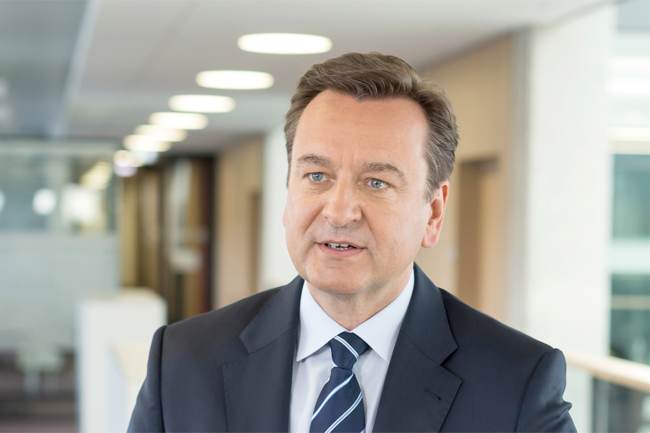Having reported EUR 3.5 billion of losses related to the COVID-19 pandemic for 2020 and now revealing an expectation of another EUR 600 million to be booked in 2021, Munich Re’s CEO Joachim Wenning today urged industry and governments to make progress on a public-private model for pandemics and other systemic risks.
 In his report to shareholders at Munich Re’s annual general meeting today, Wenning explained that Munich Re is “playing a key role in mitigating the financial impact of the coronavirus crisis,” but went on to explain that the insurance and reinsurance industry needs to do much more, in tandem with governments to be ready for the next crisis.
In his report to shareholders at Munich Re’s annual general meeting today, Wenning explained that Munich Re is “playing a key role in mitigating the financial impact of the coronavirus crisis,” but went on to explain that the insurance and reinsurance industry needs to do much more, in tandem with governments to be ready for the next crisis.
He noted that the re/insurance market can only do so much, without government participation in risks of the scale of a global pandemic.
“Resilience is a key attribute of good insurers, yet it cannot be scaled up indefinitely. The boundaries of resilience end where the boundaries of insurability end,” Wenning explained.
Adding that, “As a systemic risk, the risk of a pandemic lies fundamentally beyond these boundaries – making it impossible to insure a pandemic in its totality. That is why we must find new ways of protecting our national economies against the next pandemic.
“Governments and the private sector should pool their expertise and capabilities, and then jointly develop forward-looking solutions.”
He described a model proposed by Munich Re and others from across the insurance and reinsurance industry last year, which would involve insurers providing a minimum level of protection against pandemic risks within a framework of state-backed pandemic risk pools.
Wenning further explained, “In this way, the insurers create incentives for small and medium-sized enterprises in particular to implement in-house measures. Governments are then liable for losses that exceed the insured amount. Such a solution should be based on predefined criteria and standardised terms. This would save valuable time in an emergency and make an immediate impact.”
“I urge all of us to create such a strategy and put it into practice soon after conquering this pandemic,” Wenning said.
Wenning also said that this kind of solution need not stop at pandemic risks, pointing to other systemic level risks such as major cyber attacks.
“We can apply this idea elsewhere: a public-private model could also address other systemic risks. I am thinking of cyber attacks on systemically important networks or critical infrastructures, for example,” Wenning said.
“A targeted virus attack can cripple computer systems worldwide in mere minutes, resulting in tremendous economic losses. Just as a pandemic is uninsurable by conventional means, the private sector cannot insure such a digital blackout.”
Adding, “We aim to continually expand the boundaries of insurability, and that includes cyber risks. But we always exercise due caution so as to not overstep these boundaries.”
There have been numerous calls for pandemic and systemic risk solutions to be formed in response to the COVID-19 outbreak, as the industry realised it cannot manage these risks alone.
Having spent much of the last year excluding pandemic and communicable disease risks from most of its policies, the reinsurance sector, like Munich Re, is keen to introduce an element of coverage for these kinds of systemic risks again, but in a managed way.
But it wants to do so with the backing of governments, to support insurers in their provision of policies that are actually helpful to society, but supported by risk pools and government backstops.
“Pre-defined criteria and standardised terms” does make it sound like Munich Re is proposing something that could be parametric in nature, as others have already proposed (such as Chubb).
In a scenario like this, where businesses buy a parametric pandemic insurance policy from an insurer, while an insurer has reinsurance backing from the global market and governments also provide a layer of protection to support reinsurers, it seems the capital markets also has a key role to play.
The capital markets, through the use of insurance-linked securities (ILS), could potentially take another layer of risk, perhaps through securitizing some of the pooled pandemic risk and issuing parametric pandemic catastrophe bonds.
While government support would likely still be needed at some level, this could reduce the amount of support needed from the taxpayer, while ensuring the risk pool has retrocession to support insurers and reinsurers as they role out new forms of pandemic coverage.
The same model works for other systemic risks, where the capital market and ILS funds may have an appetite, at certain return-periods, for the types of risks covered.
Also read:
– EIOPA calls for capital markets capacity for pandemic NDBI insurance.
– ILS tech can be used to transfer pandemic risk: Syroka, Fermat Capital.
– Pandemic risk bigger than reinsurance & ILS markets alone: Schultz, Aon.
– Chubb proposes parametric risk transfer solution for pandemics.
– Lloyd’s pitches pandemic/systemic risk solutions, with capital markets support.
– ILS should play a role in pandemic backstop solutions: Survey respondents.
 View all of our Artemis Live video interviews and subscribe to our podcast.
View all of our Artemis Live video interviews and subscribe to our podcast.
All of our Artemis Live insurance-linked securities (ILS), catastrophe bonds and reinsurance video content and video interviews can be accessed online.
Our Artemis Live podcast can be subscribed to using the typical podcast services providers, including Apple, Google, Spotify and more.






























